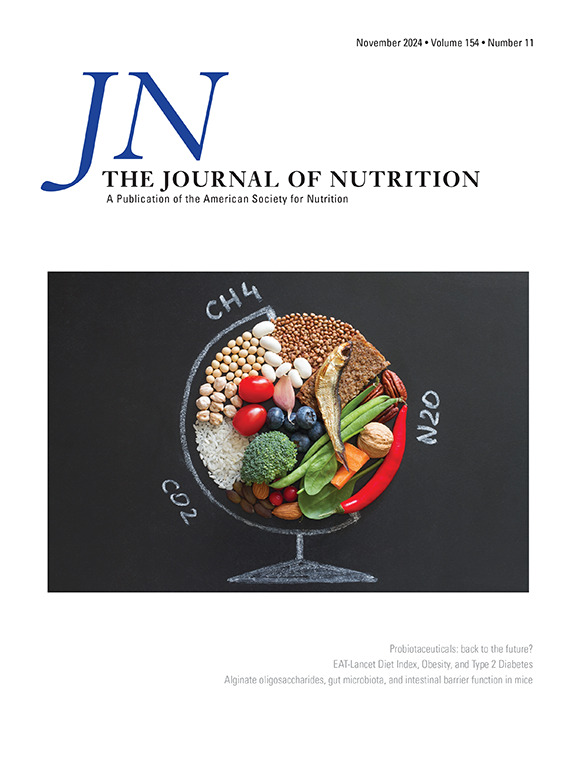食用玉米粉对人类一生健康的影响:范围审查》。
IF 3.7
3区 医学
Q2 NUTRITION & DIETETICS
引用次数: 0
摘要
玉米粉是世界上许多地区的主食,由于其多功能性和广泛的食品应用,在饮食中起着重要作用。目前,还没有关于人类玉米粉消费和健康结果的同行评议研究的全面综合。这一范围审查的目的是检查目前的文献关于玉米粉对不同人群的健康影响。2024年7月,我们系统地检索了三个数据库(PubMed、Scopus和CINAHL),以获取有关人类玉米粉消费和健康结果的文章。符合条件的研究用英文撰写,经过同行评审,并将玉米粉与基于谷物或无干预的比较物进行比较。纳入了21项研究,调查了广泛的健康结果,包括代谢标志物、婴儿生长指标以及2型糖尿病、肥胖和高胆固醇血症等慢性疾病的风险。研究结果表明,全谷物玉米制品,特别是那些富含纤维的玉米皮,对血脂和血糖有良好的影响。相反,精制玉米制品,如玉米片和挤压零食,与不太有利的代谢结果有关,特别是在代谢紊乱的个体中。这篇综述强调了玉米粉对健康的潜在影响,这取决于其加工和消费环境。虽然富含纤维的玉米粉可能对代谢有益,但高度加工的品种可能会加剧代谢风险。显然需要进行更严格、更大规模的研究,以更好地了解玉米粉消费对健康的长期影响及其在健康中的作用。注册号:开放科学框架;https://doi.org/10.17605/OSF.IO/9B8KR。本文章由计算机程序翻译,如有差异,请以英文原文为准。
Effects of Corn Flour Consumption on Human Health across the Lifespan: A Scoping Review
Corn flour, a staple food in many regions worldwide, plays a significant role in the diet due to its versatility and broad food applications. Currently, there is no comprehensive synthesis of peer-reviewed research related to human corn flour consumption and health outcomes. This scoping review aimed to examine the current literature on the health effects of corn flour across diverse populations. Three databases (PubMed, Scopus, and CINAHL) were systematically searched in July 2024 for articles that reported on human corn flour consumption and health outcomes. Eligible studies were written in English, peer-reviewed, and compared corn flour to a grain-based or no-intervention comparator. Twenty-one studies were included, investigating a wide range of health outcomes, including metabolic markers, growth metrics in infants, and risk of chronic diseases such as type 2 diabetes, obesity, and hypercholesterolemia. Findings indicated that whole grain corn products, particularly those high in fiber-rich corn bran, were associated with favorable effects on blood lipid and glycemic profiles. Conversely, refined corn products, such as cornflakes and extruded snacks, were linked to less favorable metabolic outcomes, particularly in individuals with metabolic disorders. This review highlights the potential of corn flour to affect health depending on its processing and consumption context. Although fiber-rich forms of corn flour may offer metabolic benefits, highly processed varieties may exacerbate metabolic risks. There is a clear need for more rigorous, larger-scale studies to better understand the long-term health impacts of corn flour consumption and its role in health.
Trial registration number
This study was registered at Open Science Framework (https://doi.org/10.17605/OSF.IO/9B8KR).
求助全文
通过发布文献求助,成功后即可免费获取论文全文。
去求助
来源期刊

Journal of Nutrition
医学-营养学
CiteScore
7.60
自引率
4.80%
发文量
260
审稿时长
39 days
期刊介绍:
The Journal of Nutrition (JN/J Nutr) publishes peer-reviewed original research papers covering all aspects of experimental nutrition in humans and other animal species; special articles such as reviews and biographies of prominent nutrition scientists; and issues, opinions, and commentaries on controversial issues in nutrition. Supplements are frequently published to provide extended discussion of topics of special interest.
 求助内容:
求助内容: 应助结果提醒方式:
应助结果提醒方式:


